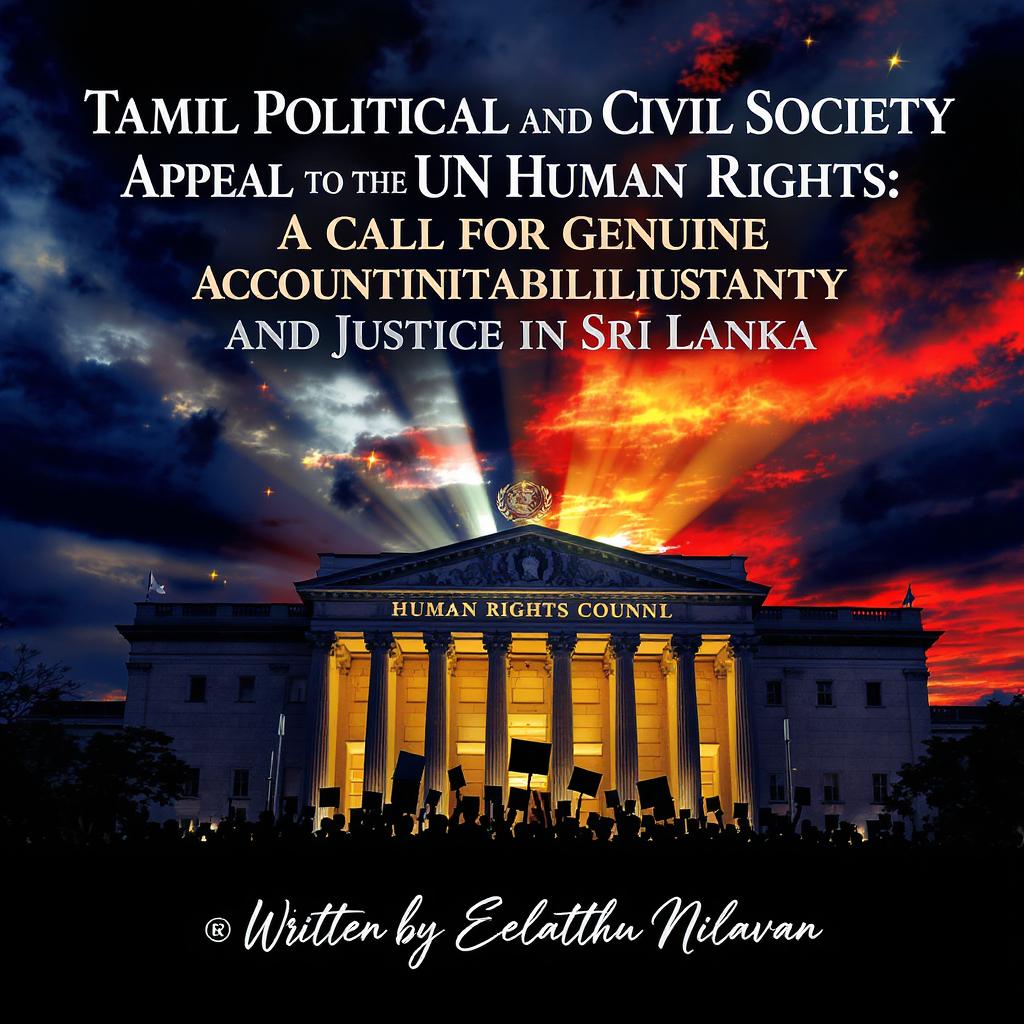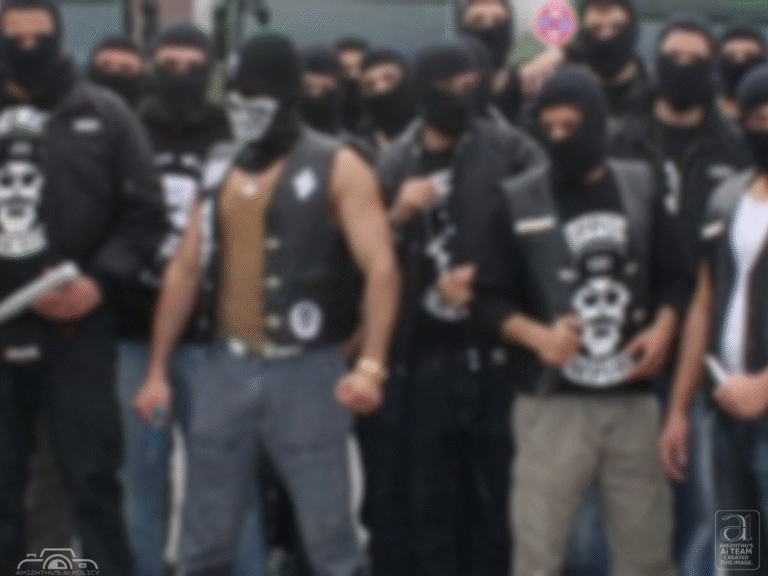Written by

Eelaththu Nilavan — A Critical Examination of the 2025 Dialogue Between Tamil Representatives and the UN Human Rights Office
In August 2025, Tamil political parties, civil society organizations, NGOs, and human rights activists from Sri Lanka united in a joint letter addressed to the United Nations High Commissioner for Human Rights and the Heads of Missions of the UN Human Rights Council (UNHRC). This letter was submitted ahead of the 60th session of the UNHRC and highlighted deep concerns about the ongoing failure to deliver justice, accountability, and reconciliation for the Tamil people in Sri Lanka. It also sought to influence the OHCHR’s upcoming report and the proposed resolution on Sri Lanka.

✦. Background and Context
The Tamil signatories expressed solidarity with the broader Tamil community and reiterated the calls made earlier in January 2021 for decisive and concrete action against war crimes and genocide committed during the Sri Lankan conflict. The letter criticized the continued lack of meaningful accountability despite multiple UN resolutions, investigations, and promises made by successive governments.
✦. Key Demands and Concerns
The letter was clear and uncompromising in its demands:
❖. UN Resolution: The Tamil representatives urged member states of the UNHRC to adopt a resolution recognizing the total absence of a genuine accountability process in Sri Lanka. They requested that the UN General Assembly and Security Council take concrete steps to refer Sri Lanka to the International Criminal Court (ICC) for the serious crimes committed during the conflict. They also called for the consideration of cases against Sri Lanka at the International Court of Justice (ICJ) for the crime of genocide against Tamils.
❖. Rejection of Domestic Mechanisms: The letter strongly opposed any attempts to grant space or time to domestic accountability mechanisms within Sri Lanka. Past efforts, they argued, have proven futile and insincere, failing to meet international standards. They emphasized that the UN system’s repeated reliance on the “principle of complementarity” — which defers to domestic processes — has been a fundamental flaw that delays justice indefinitely.
❖. Support for OSLAP: The signatories expressed concern that the accountability process remains “trapped in Geneva,” with limited progress. They acknowledged the dedication of the OHCHR staff but urged stronger support for the Office on Sri Lanka Accountability Project (OSLAP), which works with countries exercising universal jurisdiction to hold perpetrators accountable.
❖. Mass Graves and Forensic Investigations: Highlighting the recent re-excavation of mass graves in Chemmanni, the letter stressed the urgent need for international monitoring, supervision, and technical assistance in forensic excavation. They called on the UNHRC to entrust its Special Rapporteur on Extra Judicial Killings with coordinating this effort to ensure transparency and credibility.
❖. Demilitarization and Human Rights Concerns: The Tamil groups urged the OHCHR to address systemic militarization in the Northern and Eastern provinces, forced Sinhala Buddhist settlement policies (referred to as “Buddhicisation”), land grabbing, and the ongoing use of the draconian Prevention of Terrorism Act (PTA). They highlighted how these issues continue to marginalize Tamil communities and obstruct genuine reconciliation.
✦. The Tamil Community’s Frustration
The letter conveyed a powerful message of despair and lost hope within the Tamil community due to decades of unfulfilled promises, systemic discrimination, and continued impunity. It served as a solemn reminder that words without action cannot heal wounds or rebuild trust.
The letter was signed by prominent Tamil leaders and representatives of major political parties and civil society organizations, including:
Full List of Notable Signatories
➊. Political Party Leaders
G.G. Ponnambalam – Leader, Tamil National Council; General Secretary, All Ceylon Tamil Congress
A. Adaikalanathan – President, TELO; Leader, DTNA
D. Sibhadhan – President, DPLP; Co-leader, DTNA
P. Ayn Garanevan – President, Tamil National Green Organization
K. Remachandran – President, EPRLF; Co-leader, DTNA
N. S. Nambitha – Leader, (N)sekantha, Tamil National Party
K.V. Vanandu – Leader, Democratic Tamil Arasu Katchi
N. Chadrakumar – Ex-MP; General Secretary, Samathuva Katchi
➋. Religious Dignitaries
Rt. Rev. Dr. A. Gnanapragasam – Bishop, Mannar Diocese
Rt. Rev. Dr. Christian Noel Emmanuel – Bishop, Trincomalee Diocese
Rev. Fr. P. Jebaratnam – Vicar General, Jaffna Diocese
Archdeaconry of Jaffna – Church of Ceylon (Anglican)
Rev. Fr. Sherard Jayawardane
Rev. Fr. Terance Fernando
Rev. Fr. M. Sathivel
Rev. Sr. Rasika Pieris
Ven. Fr. Samuel J. Ponnaih
Rev. Fr. I. D. Dixon
Suwamy Akathiyar Adikalar, Thenkailai Aathinam, Trincomalee
➌. Civil Society Organisations (Selected from over 115 signatories)
Adaayalam Centre for Policy Research (ACPR)
Amparai District Women’s Network (ADWN)
Association for Relatives of the Enforced Disappeared (Multiple District Chapters)
Christian Solidarity Movement
Eastern University Tamil Students Union
Jaffna University Students’ Union
Tamil Civil Society Forum (TCSF)
Tamil Heritage Forum, Mullaitivu
Eastern Journalist Forum
North-East Students’ Federation
Jaffna Press Club
Women Life and Rights Association (WLRA), Kilinochchi
World Tamil Students’ Union
Voluntary Organization for Vulnerable Community Development (VOVCOD)
Justice and Peace Commission, Diocese of Jaffna
(The full list includes organizations from Vavuniya, Batticaloa, Kilinochchi, Trincomalee, Mannar, Mullaitivu, Jaffna, Amparai, and more, representing women’s networks, rural development societies, student unions, research centers, journalist associations, and more.)
✦. UN High Commissioner’s Response
On August 5, 2025, the UN High Commissioner for Human Rights, Mr. Volker Türk, responded to the joint letter. His reply acknowledged receipt of the correspondence and expressed appreciation for meeting some signatories during his recent visit to Sri Lanka. He highlighted that accountability for past and ongoing human rights violations was a central focus of his discussions with the Sri Lankan government.
Mr. Türk noted several persistent challenges that his office has identified in prior reports:
The need for the release of military-held lands
Stopping ongoing land seizures in the North and East
Releasing detainees held under the Prevention of Terrorism Act for prolonged periods
Ending harassment and surveillance of activists and communities
Decriminalizing and supporting victim-led memorialization initiatives
He emphasized that these issues are critical to building trust and confidence among victims and affected communities.
During his visit, Mr. Türk met victims and survivors and visited the Chemmanni mass grave site. He expressed hope that these engagements would “give visibility and urgency to the need for preservation of evidence and thorough and independent investigations.”
However, he was candid in acknowledging that successive Sri Lankan governments have failed to establish accountability mechanisms that are independent, effective, and aligned with international human rights standards. He encouraged the government to embark on a comprehensive process to deliver truth, justice, and accountability.
Mr. Türk pledged to continue advocating for “complementary strategies” at the international level to advance justice for victims and expressed hope that his forthcoming report to the Human Rights Council would reflect the concerns raised by Tamil organizations.
✦. Conclusion: The Road Ahead
The joint letter from Tamil political and civil society groups is a profound testimony to the enduring pain and unaddressed grievances of the Tamil people in Sri Lanka. It calls for urgent international action to break the cycle of impunity and deliver real justice — not symbolic gestures or deferrals.
While the response from the UN High Commissioner reflects an understanding of the complex challenges, the Tamil community’s demands for a referral to international courts and rejection of failed domestic mechanisms underscore their deep mistrust of the Sri Lankan state’s willingness to act fairly.
For any lasting peace and reconciliation in Sri Lanka, the voices of the Tamil people — their calls for accountability, truth, demilitarization, and recognition of their rights — must be heard and acted upon decisively by the international community.
『 Written by

Eelaththu Nilavan 』
07/08/2025
The views expressed in this article are the author’s own and do not necessarily reflect Amizhthu’s editorial stance.




